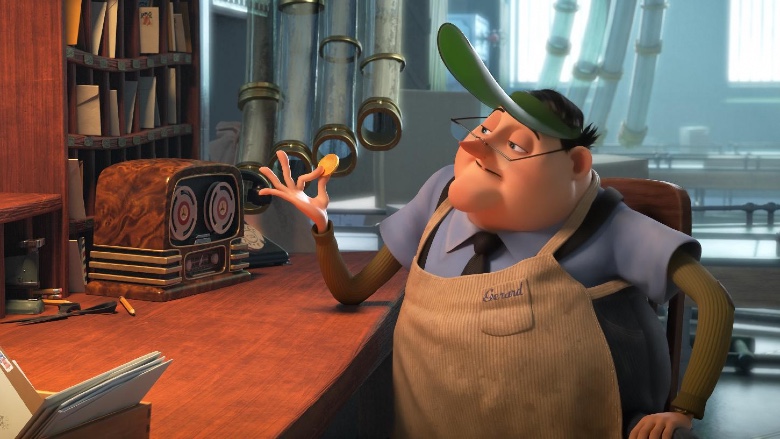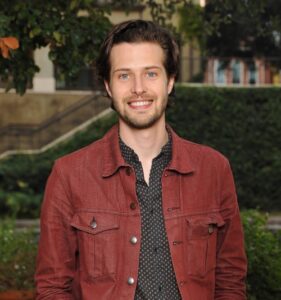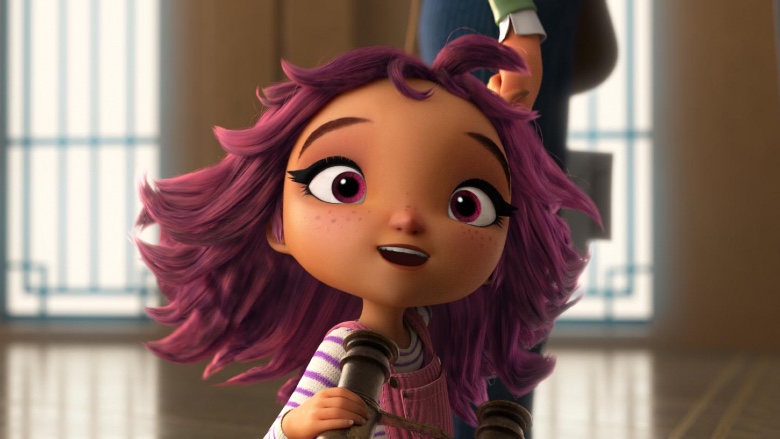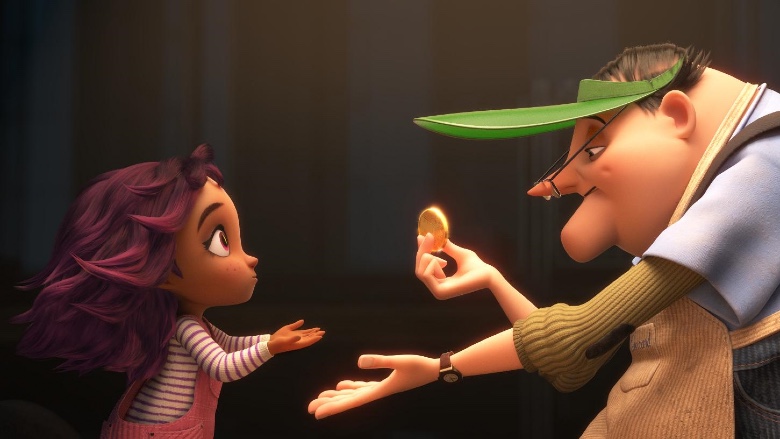
The third in our series of spotlight on some of last year’ Animated Shorts that should be watched before Oscars and Annie Awards nominations is Taylor Meacham’s To: Gerard, a gorgeously emotional wordless film made with DreamWorks Animation that can now be seen for free on the Comcast streamer Peacock.
The Gerard of the title is an older man working in the back area of a mailroom who has long had an affinity for magic after seeing a magician as a child, although he never was able to pursue that dream himself. One day, a young girl happens into Gerard’s mail-sorting area and the magical baton is passed on.
Below the Line spoke with Meacham over Zoom last week. What’s been very interesting about this project is as much about learning where the filmmaker’s idea or inspiration for the short came from as it does learning about what was involved with making it.
Below the Line: I guess you’ve been at DreamWorks Animation for some time, so are you there as a permanent staff member or are you there per project?
Taylor Meacham: No, no, I’m a permanent staff member at DreamWorks for just over five years now. The first two years of my career was in production management. I started as a coordinator on the first Trolls movie, and then after two years, I ended up transitioning into first directing on this short and then into being a storyboard artist at the studio. I just finished Croods 2, which came out in November, and then I’ve been working on the next installment of Puss in Boots.
BTL: Was your first short for DreamWorks Animation as well?
Meacham: Yes, it was my first short for DreamWorks Animation was my first-time directing animation. For the studio itself, that was the first time that they have allowed someone in management to transition into an artistic role. At that point, I’d only been out of college for about two and a half years, so it was also kind of a big deal for myself on kind of where I wanted to pivot my career towards. I was fortunate for DreamWorks to really get behind that which has been great.

BTL: I’m always interested in the animation world and what path directors take to get to that point, whether they come through story or animation. It’s not that often that someone comes from management to direct.
Meacham: No, not unless they go off to do it on their own. I’m such a firm believer that especially in this industry, there are no real rules how people get into doing what they’re doing. I’ve worked people at DreamWorks that graduated college as a philosophy major, and then they ended up being an artist. That’s the beautiful thing about animation is that there’s so many people from different walks of life that can all come together to this shared passion that’s animation. That’s what is such a beautiful thing about it.
BTL: What was your background before? What did you study in college?
Meacham: I am someone who went to school for live action filmmaking, and I’d always seen myself going off and doing a live action film. Because I didn’t get into animation or really find my passion for animation until just before I graduated college. I had set myself up since I was a little kid, because I’d always wanted to direct movies and tell stories. I tried to do anything I could since I was probably 10 years old to go to whatever high school or middle school after school classes and stuff to do anything that had to do with film. But I really kind of found my home within animation and DreamWorks.
BTL: What led you to making To: Gerard and was the inspiration to tell that story?
Meacham: I had a couple elements of it tossing around in my mind. I always keep a notebook with a couple notebooks with me of keeping ideas and ways that I’m feeling things during the day and keeping track of them. To: Gerard started as just a bunch of ideas, just a bunch of small segmented ideas. I wanted to do something that had magic in it, actual practice magic, because I used to go to magic camp as a kid, and I’ve always had a love for that art.
For whatever reason, I really wanted to do something in a post office. For whatever reason, there’s something about behind those doors, what takes place back there. There’s an element of what happens in this area that’s unseen? Just those two curiosities manifested themselves into what you see on screen. What tied it all together, the glue for it, was my relationship with my father and my hope for his life and his time kind of trying to find his way into retirement if he could. At the point that I start pulling it all together and I had that aha moment was shortly after I had a conversation with him. We talked about his life and what he wants to do and aspirations. He’s turned 70 this year, and he’s an essential worker right now. He works in Lowe’s, but he was an artist growing up and he used to ride motorcycles and go hang gliding, a lot of these more daring things that he had a real passion for that he gave up when he became a father. We had that conversation about returning to them, and he was really quick to be like, “You know, I’m okay with that. I don’t have to go back. I am happy with where I am.” I didn’t quite understand it until he said that he’s a father. He loves being a father and being a father is the greatest happiness for him, because he’s able to give back to his kids. This short film is my way of trying to understand that, because I’m not a father, I don’t have kids. I don’t know what that’s like, but I want to be able to empathize with that.
BTL: That may have been what connected with me, as well. I’m sure you were aware of the Pixar short Presto that also involved magic.
Meacham: Oh, of course. I saw that when I was growing up, and after I’d written [To: Gerard], and we started making it, I went back and watched all the things that I thought might inspire the magic. Presto is such a different… one of the most attractive things about Presto is that it’s really bringing back that Looney Tunes animation style and the pantomime and the comedy of that. As much as I loved that, what I really wanted to target with Gerard was the emotion behind the story and the message behind it. The magic they’re doing in Presto is fantastical magic — pulling ladders out of a top hat, and the humor in that is the impossible. What I wanted to do that was different from other magic in animation, like in Presto, for To: Gerard, I wanted to kind of pull back on all that and ground it in a little bit more of a reality. For most of the magic that’s in the short, we approached it with the rule of if you can’t do in real life, you shouldn’t be able to do it in this. I felt that if we’re going to really approach this story from a realistic emotional standpoint, I wanted the other elements around it to support that.
BTL: I get the impression that you watch a lot of animation by others and really analyze what makes it work. Is that the case?
Meacham: Yeah, I had to go back and watch… I mean, I’m a huge fan of Pixar shorts. If you can’t tell from To: Gerard, I’m a huge fan of animated stories that bring a certain level of emotion in general. I’ve seen all the Pixar shorts, and like I said, I’d gone back to really analyze what I enjoyed about them. I think part of being a filmmaker, too, is when you enjoy something whether its live action or reading a book, part of processing that story is, what do you enjoy about it and holding onto it. So there’s a lot of things that I enjoy about so many stories that I hold on to and I keep track of that I want to put into my own work, or what is my version of that? For To: Gerard, [besides] looking at Presto, I went and watched The Illusionist and The Prestige, which were too big films that came out while I was in magic camp. I remember being at magic camp, and the buzz around the camp was like, “These two movies are coming out, and they’re about magic!” It was a big deal to have magic portrayed on the big screen. I remember what that feeling was, so it was something I wanted to bring back.

BTL: What’s the process of getting a short developed at DreamWorks, in terms of pitching it, getting it developed? Also, doing so when you also have a day job working there.
Meacham: Yes, making the short was wearing multiple hats, because at the same time I was directing the short, I had just started as a storyboard artist for the first time in my life. It was like taking off a leadership hat, and then going and working on Croods, and going from someone who was leading a team of people to tell a story, to someone who is being mentored by other experienced story artists at this other job, in this other position. That definitely was this kind of back and forth throughout the process.
I can only really speak about what my pitching process was like, because I know it’s different for everybody, depending on whether you’re coming in from out of the studio, or if you’re pitching pitching a feature film. For me, it was relatively straightforward. I was part of the people on the management side that was actually facilitating the pitches that were happening for the shorts program at the time. I was going in and setting up the pitches for the artists that were coming in and giving them little pep talks. At the very end, I had submitted a logline for my film to pitch, and I ended up pitching to someone I worked for, Jeff Hermann, who was the producer on the film and the heads of development. But I got in there right at the end, and I did a verbal pitch. I basically just walked them through the story of my dad and my connection with him – basically, a longer version of what I told you – and then walked them through the story. Since it’s so short, I figured I could walk them through story. I acted out all the characters for them, unintentionally, just because I tend to be very animated as a person. But I basically put on a show for them. They ended up expediting me that same day to pitch to the head of the studio, and he gave the thumbs up, and we went from there. The next process was just doing the film, getting artists on board, getting them excited about the project and taking the stuff that was on the page and putting characters to that, putting locations to that.
BTL: How big a team did you have the largest point, and was a lot of this done before the pandemic hit?
Meacham: It was done before the pandemic. I think in total, we had about 100 people, but I don’t think we ever had 100 people at once working on it. Maybe 20 or 30 people at a time, depending on availability. We’re working on feature films at the studio, too, so the priority is, if we’re working on Trolls World Tour or Boss Baby 2, we need to go to those movies and ask them if we can borrow their artists for a couple weeks. It’s really taking advantage of who is available, and who is excited about the project. Our producer Jeff Hermann did a lot. I mean, I owe him so much. He did so much of that legwork to search for artists at the studio that were available and could come on to it, because Jeff believed in the project, just as much as as I did.
BTL: I’ve noticed two trends with animated shorts lately: One is that they’re often free of dialogue and the other is that they tend to make me cry. This was definitely a case of both, because I teared up each time I watched it. I know there are obvious reasons to go wordless since you don’t need to take the time dubbing actors, but also it translates better into other countries.
Meacham: For me, doing a short that was all pantomime, I was pulling from my inspirations. As I said before, a big inspiration was Pixar shorts, which are predominantly pantomimed, and those shorts are influenced by vaudeville and by silent films. If you’re going way back, that’s the inspiration for it. I wasn’t approaching it as a cost efficient. I was just writing for the sake of writing and telling the story. It was a goal of mine to convey that level of emotion non-verbally, not just for the universal nature of it, but because I knew that there was going to be a challenge there. I just think it’s so beautiful to be able to connect with animated characters. The fact that us as people are able to watch an animated film and put our whole selves into those characters that are completely made up. They don’t exist in the real world! They’re not actors that we’ll see in Hollywood or something. My appreciation for how we are able to make that emotional connection, I just wanted to strengthen that connection and explore that more by making it pantomime. And the magic speaks for itself. The communication between Jules and Gerard in the short, it’s all done through the magic, so the magic really is their words.

BTL: Obviously, the music added a lot to bringing out those emotions, and I don’t know who the composer was, but how did you work with him on what the music should be?
Meacham: I adore the music. Her, actually. Layla [Minoui] came to us through the Universal Music Diversity Program. It’s been very important through Universal and NBC to bring more diverse composers into filmmaking, and Layla came out of that program. Her and I had spoken over the phone from the program, and there was a variety of composers that we had worked with to see if they would be right for the short. Layla was on vacation, I believe, when we started the program, so I’d spoken to her on the phone and she was on vacation. While she was on vacation, she had a little piano, and she just wrote a medley for it and sent it over. I judged a lot of the music by did it feel emotionally right? Did it hit a chord within me and what I wanted to accomplish through the film? Everything that she did was just spot on. It’s been such a pleasure to get to work with her, because she’s just ridiculously talented.
BTL: Has she gone on to do other things?
Meacham: I’m not sure what exactly she’s doing right now I know she works in television doing music. She was just nominated actually, for the short at the HMMAs, I believe it was lats week. The wonderful thing is that I’m so happy to see her getting recognized for the great work that she’s done on the short. Being able to work with her, we went to Abbey Road and we recorded the score at Abbey Road, and that was a first time for both of us and to see it come to life with a full orchestra, it was just incredible. To your point of the film not having dialogue in it, I think if you pull one thing out, you really needed to raise another element of it, and music is hugely important in communicating emotion in this short, and in communicating the unspoken dialogue, and she does a fantastic job of that.
BTL: Did this play at any festivals before it went onto Peacock?
Meacham: Yes, most of 2020 it was doing different festivals all over the world. We debuted it in Tribeca, and then we did Annecy and then it did a series of domestic and foreign festivals. Some festivals in Canada were able to see it in person and in New Zealand, we were able to do it in person. I’m sure a couple other ones in Europe were able to do it in person, which is really nice.
BTL: You obviously finished the short before the pandemic hit, but how has the transition been to working from home and how has it generally affected the work you do?
Meacham: For the short, at least, the downside of the pandemic is that all the festivals have been online, and we are missing our animation community. I think one of the biggest parts of having a short film come out or even having a film come out in the animation community is being able to share it with other people that love it so much. As animation is really the Island of Misfit Toys in so many ways and you want to be able to get with those people that see it in the same way. It is sad to not be able to share it and celebrate with people in person. On the work side, I’ve been really fortunate enough to just migrate everything home. It’s been pretty minor working for the studio. We’re been plugging away, and we’re still making our feature films. The great thing is, because we have been working from home and everything has gone virtual, I’ve been able to attend more festivals simultaneously. If there’s two festivals over the same week – I think one was in Toronto and one would be in Spain or something – there’s no way I could be in those two places to experience both of those, but from the comfort of my office, I absolutely can. And I can see other people’s films and be part of those panels and share the story of this film, which has been a real gift.
To: Gerard is now available to watch for free on NBC/Universal’s streaming network, Peacock.
You can read about a few other animated series here.
All pictures courtesy DreamWorks Animation.





